Can Meat Go in a Compost Bin?
Composting is an excellent way to reduce waste and create nutrient-rich soil for your garden. However, when it comes to meat scraps, there seems to be some conflicting information. Some sources say it’s safe to compost meat, while others advise against it. Let’s take a closer look at the arguments and find out the truth.
The Argument Against Composting Meat
According to sources like Gardening Know How and Happy Sprout, it is not recommended to put meat in a compost bin. This is primarily due to the potential risks of attracting pests and spreading pathogens.
Meat scraps can attract unwanted visitors such as rats, raccoons, and flies to your compost pile. These pests can cause damage and create a nuisance in your yard. Additionally, meat can contain harmful bacteria, including E. coli and Salmonella, which can survive in a compost pile and contaminate your soil.
The Argument in Favor of Composting Meat
On the other hand, sources like Tips Bulletin and New Life on a Homestead suggest that it is safe to compost meat scraps with proper precautions.
While it is true that meat can attract pests and pathogens, these sources argue that if you take the right steps, you can minimize these risks. Meat should only make up a small percentage of your compost and should be mixed in and kept within the interior of the pile. This helps to reduce the chances of pests being attracted to the pile.
It is also important to ensure that your compost pile reaches a high enough temperature to kill off any potential pathogens. This process, known as hot composting, involves maintaining a temperature of at least 140°F (60°C) for several days. Regularly turning and stirring the pile can help with decomposition and heat distribution.
Expert Opinions
While there are differing opinions on the matter, it is worth noting that some sources, such as Gardening Know How, do acknowledge that meat scraps can be composted. However, they emphasize that this is more suitable for specialized facilities and not recommended for home gardeners.
Specialized facilities have the necessary infrastructure and expertise to handle composting meat on a larger scale. The resulting organic material is safe for use on commercial crops. For home gardeners, it may be safer to explore alternative disposal methods for meat scraps, such as contacting local compost or recycling facilities for guidance.
Conclusion
Based on the information from various sources, it can be concluded that while it is possible to compost meat scraps, it is not without risks. Meat can attract pests and harbor harmful bacteria, which can contaminate your compost and soil. If you choose to compost meat, it is crucial to take precautions such as burying the scraps in the center of a large compost pile, maintaining high temperatures, and carefully managing the composting process.
However, considering the potential challenges and risks involved, it may be wise for home gardeners to explore alternative methods of disposing of meat scraps. This could include contacting local compost or recycling facilities for guidance on proper disposal.
Related Websites:
- Gardening Know How – Composting Meat Scraps
- Happy Sprout – Can You Compost Meat Scraps?
- Tips Bulletin – Can You Compost Meat?
- New Life on a Homestead – How to Compost Meat Scraps
- Sustainable Jungle – What’s Not Compostable?
- Morning Chores – What Not to Compost
- Gardening Chores – What Not to Put in Compost
FAQs:
Q: What are the benefits of composting?
Composting has several benefits. It helps reduce landfill waste, enriches soil health, and reduces the need for chemical fertilizers. Additionally, composting can also help retain soil moisture and promote the growth of healthy plants.
Q: Can meat be composted?
Meat is generally not recommended for composting due to the potential for attracting pests, producing odors, and causing imbalances in the compost pile. It is best to avoid composting meat to maintain a healthy composting process.
Q: What can be composted?
Various organic materials can be composted, including fruit and vegetable scraps, coffee grounds, tea leaves, yard waste, and eggshells. These items provide a good balance of carbon and nitrogen for a healthy compost pile.
Q: What are some alternatives for disposing of meat scraps?
Instead of composting meat scraps, consider other methods such as freezing them for later use in soups or stocks, donating them to local farms for animal feed, or placing them in a secure, animal-proof bin for municipal waste disposal.
Q: Can I still compost other food waste if I can’t compost meat?
Absolutely! There are numerous compostable food waste items that you can still compost. This includes fruit and vegetable scraps, coffee grounds, tea leaves, eggshells, bread, grains, and more. Just make sure to avoid including any dairy or oily items in your compost pile.






